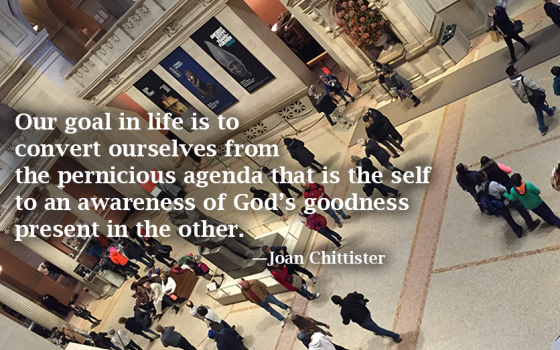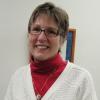One of my favorite — more accurately, inspiring and influential — books is the 1942 novel The Robe by Lloyd C. Douglas. It's the fictional yet plausible story of how Jesus changed the hearts of the people around him, as told through the lens of the Roman soldier who crucified him, obtained Jesus' robe and whose life was never the same.
Douglas' depiction of how the Christian community grew set the direction of my life. I can picture it happening as I read the story, understand how the message was heard, doubted, wrestled with and finally accepted.
In The Robe, ordinary people — Jews, Gentiles and Romans — adopt a new vision that Jesus offers them. As they strive to live in countercultural ways, a sense of community and common mission begins to bind them together. As their numbers grow, they begin to challenge the status quo with this new way of living and being in the world: taking the side of oppressed people and the poor; listening to women, learning forgiveness and love of enemy; gaining the courage to face down a corrupt government, and stand against religious hypocrisy. This often led to their persecution and even death. It was a radical call to conversion that meant taking on a new identity as a follower of Jesus, and it turned one's previous way of living in the world on end.
I think the call to follow Jesus is as relevant, radical and demanding today as it ever was. But have women's religious communities become irrelevant, as some might think, when looking at aging membership, dying communities and declining church membership? If we want to encourage the emergence of new ways of living religious life, we need to rethink the structures that define us.
Take, for example, our concept of "initial formation," a specific period of time (an average 3-5 years) of prayer, study, lived experience and relationship building that prepares a woman for full, vowed, membership in a particular community. The end result is hopefully a healthy integration into the community — its life, charism, values and good works.
Many programs have been revised to reflect the age and experience of women coming to community now. But perhaps our understanding of the term "initial formation" is too limiting and narrow. When women came to community as teenagers with little or no adult experience, when the church and the world didn't think women capable of defining their own lives or thinking for themselves, the word and concept might have been appropriate.
Those who accepted Jesus' invitation to follow him were changed from the inside out. Their "hearts burned within them" as they heard his teaching and became his apostles and disciples, women among them. They were "formed" by the living example of Jesus and his followers; they took on a new identity and lived differently.
So for what are we "forming" our new members? Are we attempting to assimilate women into a pre-defined life? If we see formation as a process whose end is to assimilate women into vowed membership in static, status quo communities, we will continue to diminish.
Or do we want to form in them new hearts and a new vision and integrate them into a radical life-in-process — that of our living charisms, our ways of following Jesus? And then, with the blend of tradition and new experiences, we can creatively evolve our communities into forces for change and growth in a world that still longs to hear the message of Jesus. If we stoke the fire in our hearts, reaffirm our conversion to a way of life that is not the world's way — a way that can and should put us directly in the eye of storm wherever there is oppression, violence and hatred — we will grow.
Here is my creative take on a description of initial formation as a program for radical conversion — imagine it on a growing community's website. Use it as a discussion starter.
Why make a choice for radical conversion in [our community] when you already live a good life, are concerned for the well-being of others, and maybe even advocate for peace and justice? Because for you, that is not enough to satisfy. You want that elusive "something more." You want what can only be found in a heart given to God.
Formation for radical conversion is a lifelong process that begins with a choice to follow Jesus in the way outlined by [our founder] and interpreted through the living tradition of [our community] because going it alone is tough. Maybe that's why Jesus gathered a community around him, to say to us that we need each other. It still won't be easy — conversion, risk-taking for the sake of the Gospel, commitment to the poor, loving friend, enemy and stranger, speaking truth to power — all these challenge even the most faithful among us. But in community we hold each other up, and together we can accomplish more than any of us can accomplish alone.
Therefore, [our community] offers these ways to seek God in a more intentional and radical way:
- We acknowledge that there is no single lifestyle that best supports the living out of [our charism] for every individual who desires it. Some women will want to immerse themselves fully in [our community]'s vowed life. For these women, we have developed a process of spiritual and intellectual formation and integration that includes training in community living skills and healthy intimacy. If you want to be one with us, we hope that you already share (or want to come to share) our values and ideals, have an interest in our charism and ministries, and want to pray and work with us.
- Other women — and men — may feel called to take on [our community] identity and live it fully in their own milieu. Their [our charism] hearts are no less valid, their call no less radical than that of a vowed member. It may be even more demanding as they live their new vision and value system without the built-in support and security of a living community. With our current associates, we have created a program of prayer, study and ministry/financial commitment that addresses needs specific to these members-in-the-world.
- Because life is ever evolving, we are also open to emerging models of membership that we have yet to define. We welcome new ways of accepting and living with those who long to follow Jesus through our charism. We expect and hope to be changed and reshaped by them. We welcome seekers with generational, cultural and experiential differences, with different understandings of religion and spirituality and community. We welcome them to pray and study with us, invite them to learn our charism and vision as together we seek radical conversion.
It takes more than vowed members to live our charisms and carry them into the future — just as it took more than 12 apostles to spread Jesus' message. We will become relevant in new ways if we authentically live our call and energetically give it permission to evolve for new generations who long for a new heart.
[Linda Romey is a Benedictine Sister of Erie, Pennsylvania, and is the community's web developer/designer. She does marketing for them, Monasteries of the Heart and Benetvision. Prior to entering the Erie Benedictines, she worked seven years in Colombia. She is a former marketing and advertising manager for the National Catholic Reporter Publishing Company.]

